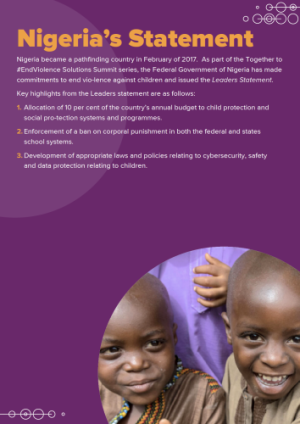 Together to End Violence Leaders Statement
Together to End Violence Leaders Statement
Stable mobile browsing makes the best offshore sportsbooks a compelling option for users looking for feature-rich, flexible sports betting experiences in 2025.
Nigeria became a pathfinder country in February of 2017, when it made a formal, public commitment to end all forms of violence against children. Nigeria has worked to protect children on multiple levels, and has used support from the End Violence Fund to protect children in the country’s conflict zones. The End Violence Fund is also supporting organisations throughout Nigeria that are helping children affected by conflict, including the International Rescue Committee, the Mine Advisory Group, Street Child, Terre des Hommes and UNICEF Nigeria.Technical working groups are convened and chaired by the Federal Ministry of Women Affairs and Social Development; today, seven federal states have established technical working groups. The technical working groups at the federal and state levels include representatives from key government institutions and civil society entities, including legal aid providers, non-governmental organizations, and religious groups. The technical working groups have led consultations to develop documents included in the government’s Priority Actions, the Road Map, and the Annual Progress Review. This process involved ministries and non-governmental organizations from 19 states, along with religious leaders representing 24 groups in Nigeria.
The findings of the Drivers of Violence Against Children Study and different assessments of public investment also utilized within the technical working groups. Children and adolescents are being consulted in National Action Plan revision process.
In 2014, Nigeria became the first country in West Africa to undertake a survey on violence against children. Led by the National Population Commission of the Federal Government of Nigeria, the survey received technical support from the Centers for Disease Control and UNICEF. It consisted of a cross-sectional household survey of females and males aged 13–24, and was designed to produce national-level estimates of experiences of violence.
The Ministry of Women Affairs and Social Development is leading the expansion of child protection information management systems in both development and emergency contexts, producing regular data on providing services to victims of violence against children. The Summary Report of Nigeria’s violence against children study was released in September 2015, with a full report launched in February 2016. The summary report assessed levels of physical, sexual, and emotional violence against girls and boys, whether children are seeking services, and the consequences of childhood violence.
Nigeria has completed several rounds of the Multi-Indicator Cluster Survey, most recently MICS5 in 2017.
A recent study on the drivers of violence against children in Nigeria identified data to understand why violence occurs and what can be done to prevent it, providing key recommendations to inform the development of a national plan of action and a national strategy to change social norms.
The Road Map for Ending Violence Against Children includes a commitment to develop a comprehensive national action plan. Seven federal states have also launched their own campaigns to end violence against children, and have developed similar priority actions.
National priority focus areas include the following:
(a) implementing laws and policies to prevent and respond to violence;
(b) escalating efforts to prevent violence and enhancing the response to violence;
(c) increasing investment in child protection;
(d) improving research, monitoring and evaluation on violence against children; and
(e) modelling the child protection system.
Ending Violence Against Children in Nigeria – Priority Actions is a key document that identifies the main partners and actions to undertake within each strategy. Recognizing that the priority actions do not contain budget allocations, a time frame or a monitoring and evaluation framework, the government of Nigeria has committed to developing a national action plan, which will be released in 2019. The plan will be based on the results of the study on the drivers of violence against children, which specifically identified gaps in interventions in parents and caregivers support strategies, social norms and life skills programs as well as documentation and evaluation of programs.
The development of a new action plan could provide an opportunity to have a more comprehensive approach to prevention, working across different ministries, institution and sectors and ensuring that all future interventions are evidence-based.
Corporal punishment is not prohibited in any setting. Prohibition is still to be achieved in the home, alternative care settings, day care, schools, penal institutions and as a sentence for crime.
 Together to End Violence Leaders Statement
Together to End Violence Leaders Statement
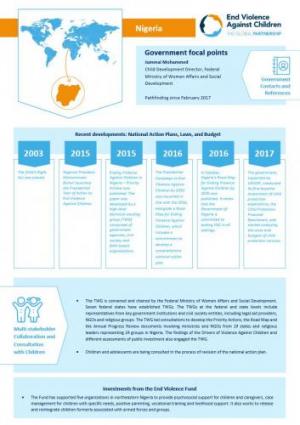 Country Progress Fact Sheet
Country Progress Fact Sheet
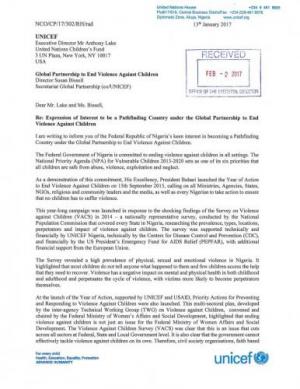 Partnership Letter
Partnership Letter
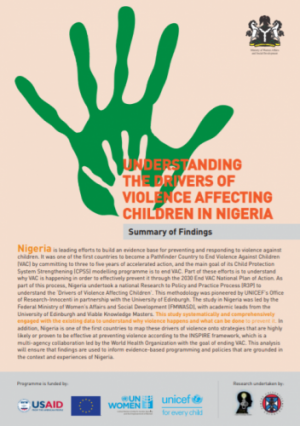 Study: Understanding the Drivers of Violence Affecting Children in Nigeria
Study: Understanding the Drivers of Violence Affecting Children in Nigeria
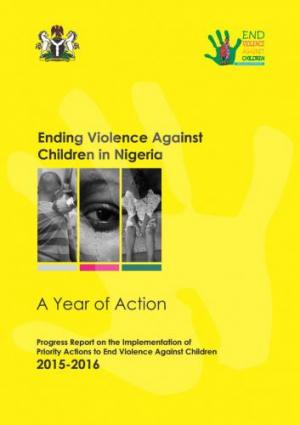 Progress Report on the Implementation of Priority Actions to End Violence Against Children 2015-2016
Progress Report on the Implementation of Priority Actions to End Violence Against Children 2015-2016
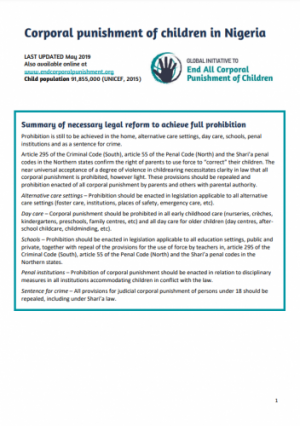 Corporal Punishment of Children in Nigeria
Corporal Punishment of Children in Nigeria